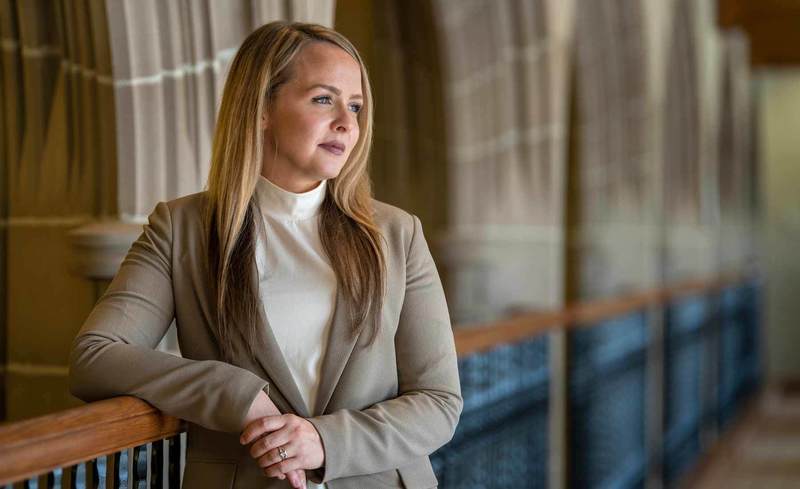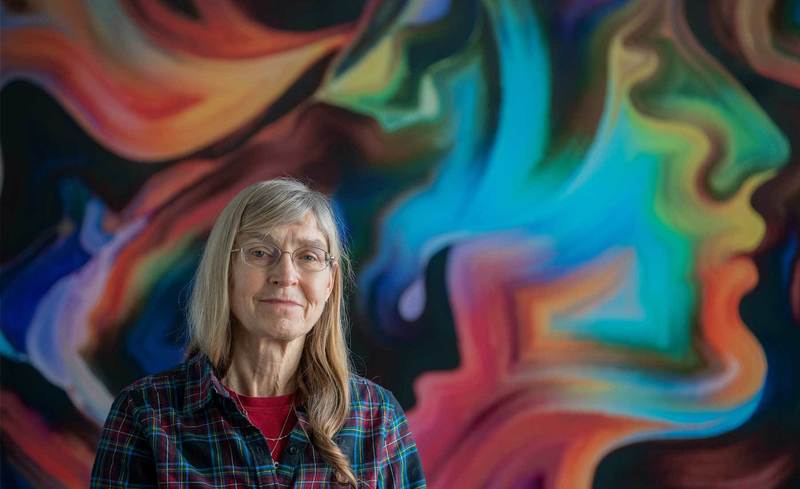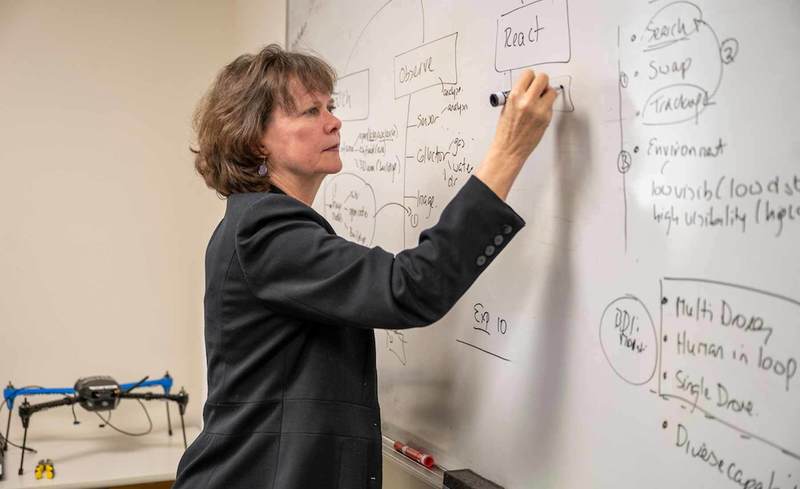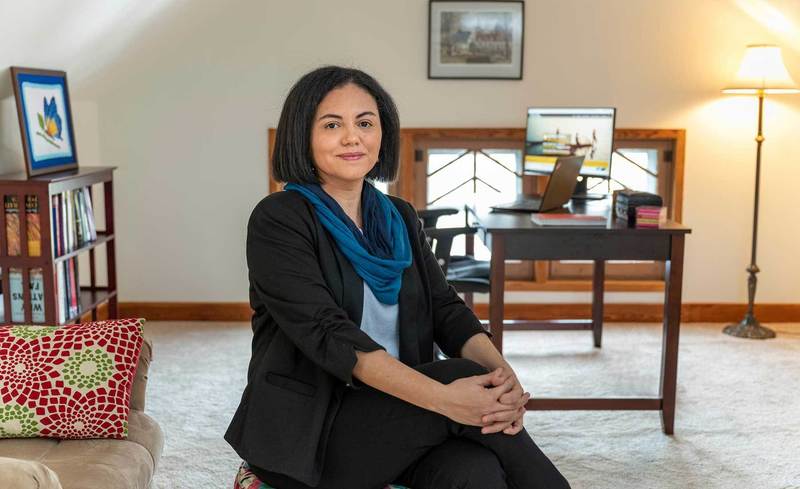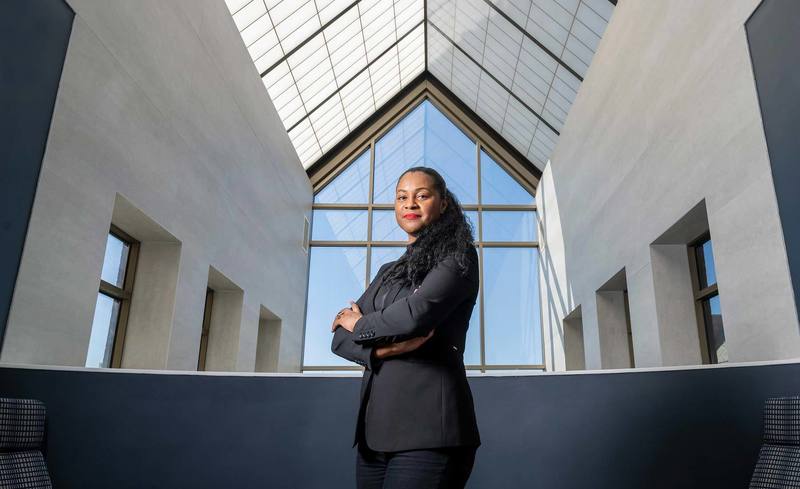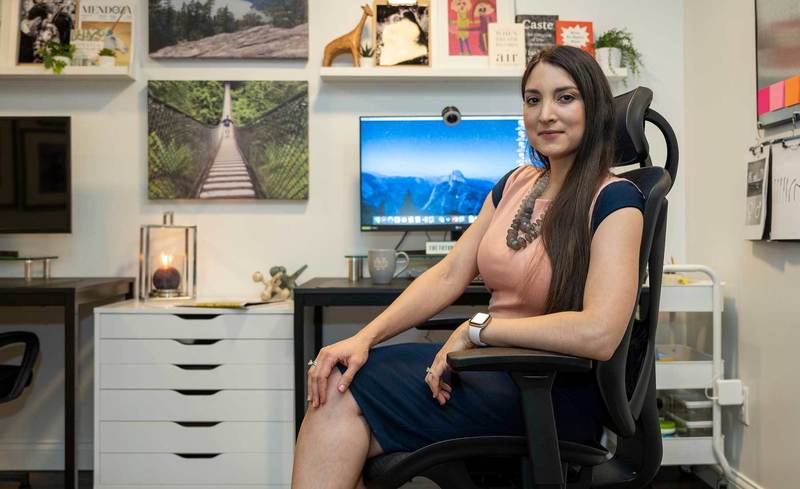Facts, Figures and Frontiers
Fang Liu
College of Science
Professor of Applied and Computational Mathematics and Statistics
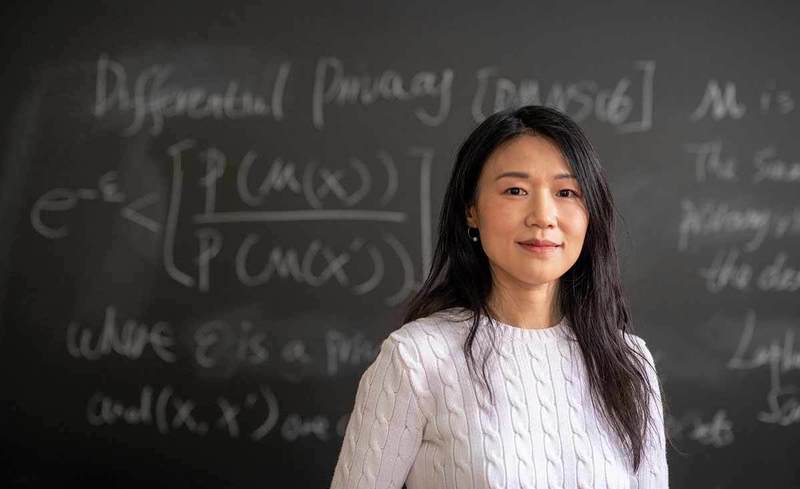
Fang Liu, professor in the University of Notre Dame’s Department of Applied and Computational Mathematics and Statistics, enjoys finding creative ways to add a statistician’s touch to the fields of data privacy, differential privacy, Bayesian statistics and applied statistics.
“Dr. Liu’s best trait as a researcher is her amazing ability to apply her knowledge to various fields of study,” said Evercita Eugenio, who was advised by Liu and earned her doctorate at Notre Dame in 2019 and now works as a statistician for Sandia National Laboratories. “Whether it is randomized clinical trials or differential privacy or social science, she is able to effectively use her statistical knowledge to analyze the different types of data and answer the unique questions in each field.”
Liu has always enjoyed mathematics and participated in various math competitions prior to college. As a child, she could sit and work on math problems all day, and wanted to be a mathematician. But her parents, with the best of intentions, discouraged that path.
“They wanted me to major in something that allowed me to more easily find a stable job, like in medicine,” Liu said. In China, where she grew up and attended college, becoming a physician requires only a five-year degree from a medical college, without the undergraduate degree requirement.
In the end, “we compromised with each other,” Liu said. “I got into Peking University, a top university in China, and eventually I majored in biological sciences. ... It’s not math, it’s not what I wanted, but it was one of the hottest majors at that time and was dubbed as the science for the 21st century.” Plus, students majoring in biology were still required to take several advanced mathematics and computer programming courses, and a biostatistics course, so her studies held her interest.
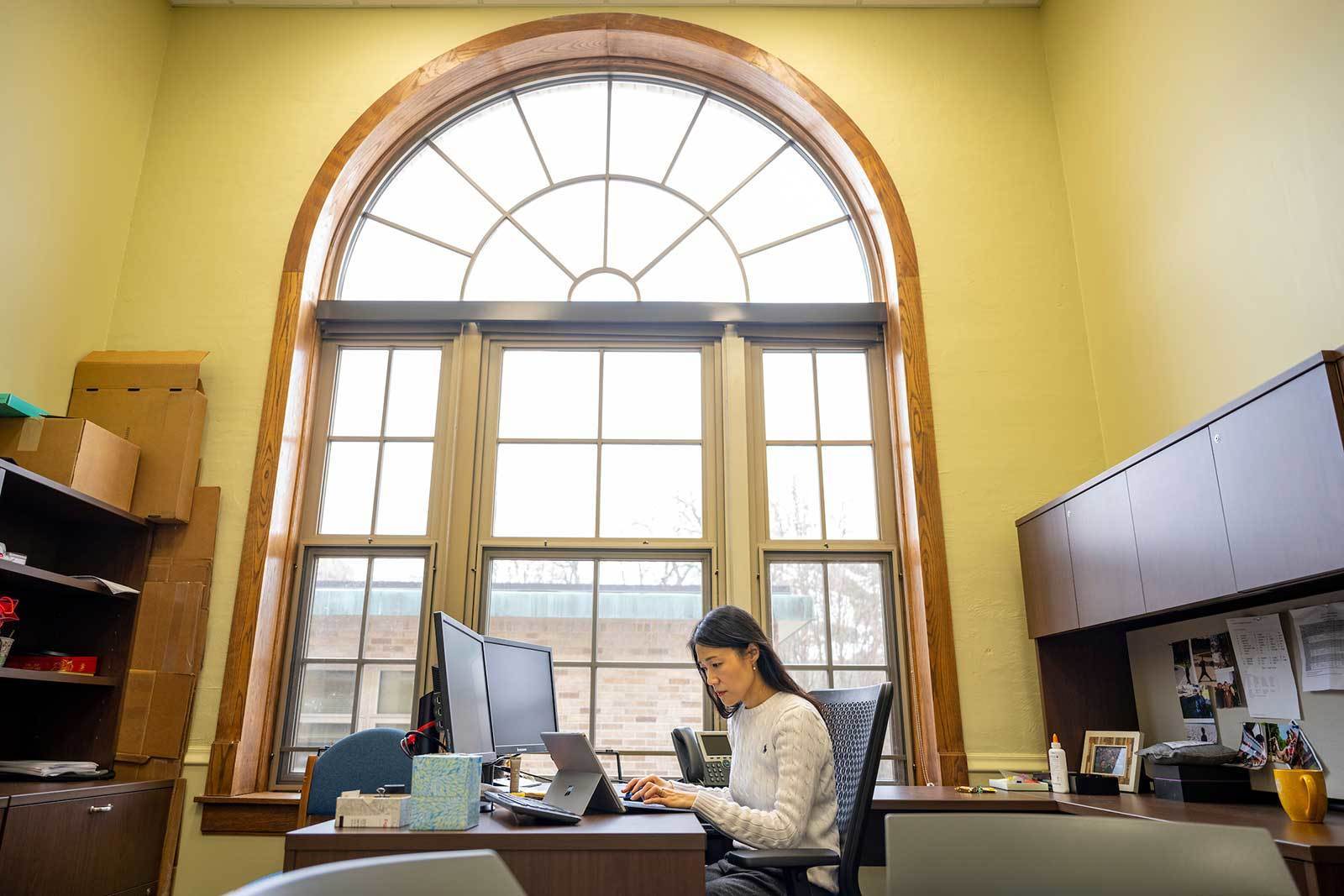
She attended Iowa State University for graduate school focusing on genetics. However, a year later she realized she simply didn’t enjoy working in a lab, and jumped at the chance to switch to statistics, a graduate degree for which the university was known at the time. She also realized that statisticians were in high demand. With her previous training and strong interest in math, she quickly picked up the topics in statistics.
Upon earning a master’s degree in statistics, she entered the doctoral program at the University of Michigan in Ann Arbor. Her thesis adviser, Roderick Little, a top-notch scholar and professor in statistics, introduced her to the field of data privacy and confidentiality.
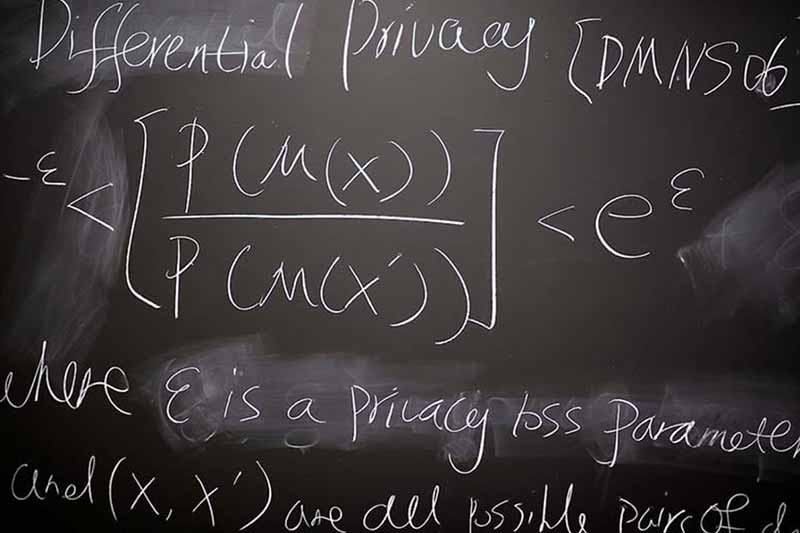
The way she approaches a research problem is by reading recently published research papers on a variety of related topics, to stay up to date on what she calls “frontier problems.”
For instance, one of her research interests is in a field called differential privacy. It is a way to share information in a dataset while withholding information that could identify individuals within it. The concept, which was introduced in 2006 by four computer scientists and won the 2016 “test of time” award at a top computer science conference and the 2017 Gödel Prize, wasn’t originally studied by statisticians because they traditionally have a different way of approaching data privacy. She was fascinated.
“I thought it might be good to bridge that idea, and borrow the differential privacy concept and see how statisticians can offer a different perspective from a computer scientist,” she said. “I started to read a lot of papers, to get an understanding of what this concept was, and found out there are so many topics I can work on as a statistician — there is so much low-hanging fruit you can grab.”
In addition to privacy, Liu has several other research interests such as Bayesian statistics and machine learning. For instance, one of her students is working on reinforcement learning that has wide applications ranging from video game designs to finance and trading, and another is working on a project that analyzes social media data to review users’ emotional health during the pandemic.
She has been collaborating on research projects with several medical entomologists at Notre Dame, supported by some of the largest grant funding at Notre Dame. She said she has enjoyed working with Nicole Achee and Neil Lobo, both research professors, and John Grieco, research associate professor, all in the Department of Biological Sciences, on two large-scale clinical trials that focus on controlling vector-borne illnesses caused by mosquitoes.
Her expertise has been important during the University’s coronavirus response, when Marie Lynn Miranda, the Charles and Jill Fischer Provost, called upon her in August to quickly develop a strategy for surveillance testing of students, faculty and staff for the virus. Within a couple of days, Liu developed a step-by-step process that was endorsed by Miranda and Dr. Mark Fox of the St. Joseph County Health Department. Surveillance testing isn’t intended to diagnose people with symptoms, but rather collect enough data from samples to monitor the spread of the disease within a community.
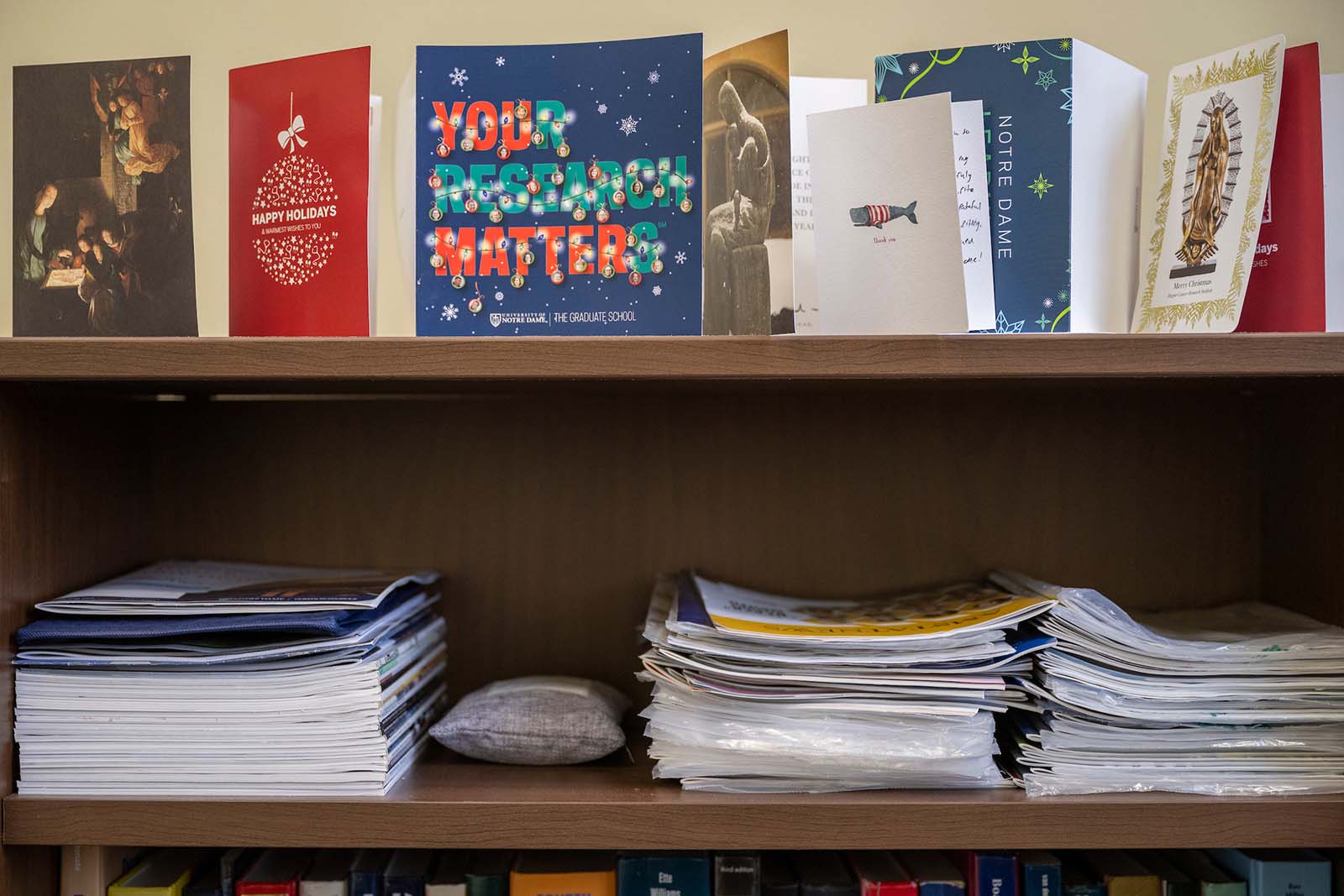
“Fang Liu is an exceptional scientist and problem solver,” said Miranda. “She understood the challenges we were facing, the urgency of our need, and she quickly developed a sophisticated modeling plan to suit the capabilities and constraints of our nascent surveillance testing program. Her work helped us navigate a difficult fall semester, and we are all grateful for the expertise and diligence she brought to this task.”
At the time, it was not realistic to test everyone on campus within a very short period of time, Liu said, and the strategy she proposed was more complex than what the campus is doing now.
“Now the University has implemented saliva-based testing, which is cheaper, quicker, and enables us to perform large-scale surveillance testing more efficiently,” she said.
Liu is also looking into how privacy is protected during data collection and information sharing during the pandemic. For example, location-based contact tracing often collects people’s travel histories — where they were, and who they came to contact with — all of which can be sensitive information. She examines different approaches of information collection and sharing without compromising privacy.
“I remember being asked a question about how I saw myself as a female professor — I remember that conversation vividly. I said I do not see myself as a female professor; I see myself as a professor.”
Liu said she’s aware that as a female professor in a male-dominated field, many female students look up to her. And as a mother, she knows the rigor of balancing her life between work and family and fully understands how many women in academia struggle once they have children.
“My husband is not in academia but he understands the busy lives of academics, and we have always shared the responsibilities of running the household and raising our son,” she said.
Though she acknowledged that female professors might have different challenges than male professors, she doesn’t regularly ponder the differences.
“I remember being asked a question about how I saw myself as a female professor — I remember that conversation vividly,” Liu said. “I said I do not see myself as a female professor; I see myself as a professor.”
Claire Bowen, who earned her doctorate at Notre Dame in 2018 and is now the lead scientist in privacy and data security at the Urban Institute in Washington, D.C., was advised by Liu and learned how to become a thorough and careful researcher throughout her graduate career. Liu instilled in her the habit of questioning results to ensure that the analysis or methodology was done correctly, setting a high standard.
She also found Liu to be a compassionate adviser, something she has heard is rare in science academia.
“Fang was different,” she said. “Her mindset was that as long as we made progress and met our research expectations, we were free to pursue other activities or travel when need be.”
For instance, Liu supported Bowen’s involvement in the Association for Women in Science at Notre Dame and in the College of Science Council. When Bowen needed to travel to see her family, Liu would tell her to enjoy her trip and said she would see her at the next meeting when she returned.
“While this seems normal, again, not many Ph.D. advisers have this mentality or support their students in this manner,” Bowen said.
Liu believes that this is part of her vocation, and has enjoyed both her teaching and research responsibilities since joining the faculty at Notre Dame.
“I love the constant intellectual challenge in academia, as well as mentoring doctoral students and witnessing them develop into fine researchers,” Liu said. “I also enjoy collaborating with wonderful researchers and scientists from various fields. Just as the great John Tukey once said, ‘The best thing about being a statistician is that you get to play in everyone’s backyard.’”
Other Stories
